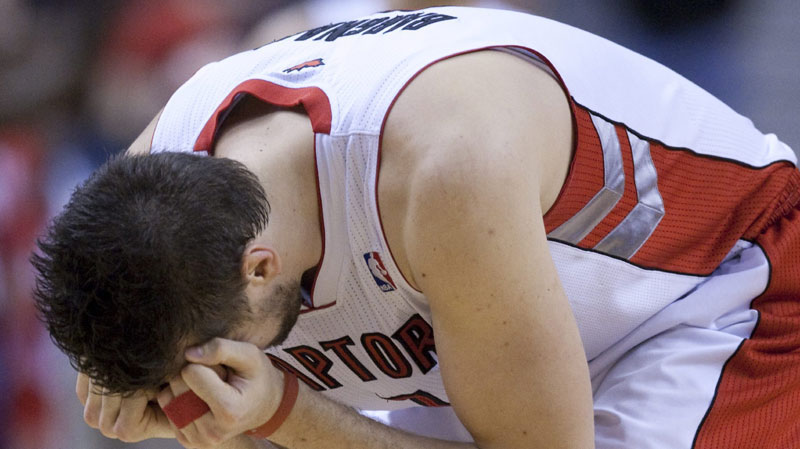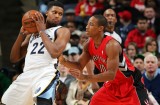
We’ve spent a lot of time around these parts looking ahead to next year of late. Specifically, we’ve provided Tools for Tanking, constant reverse-standings updates, prospect profiles and draft boards, and a forum for Tank Nation to rejoice or revolt, depending on the game. While a lot of the focus has been on the 2012 Draft, and rightfully so, it’s not lost on Raptor fans that the team essentially has a second lottery pick coming on board next year in the form of Lithuanian big-man Jonas Valanciunas.
As you may recall, Jonas was selected with the 5th overall selection in 2011. The pick wasn’t immediately popular, both because of the timeline it hinted at (the team confirmed right away that Jonas would remain overseas for a year), and because of the team’s oft-earned reputation of being so Euro-centric. With that said, the fan base, media, and scouting community all warmed up to the pick as the offseason and regular season wore on, to the point that some have claimed Jonas will be the 2nd best player from the draft class, and the Raptors got a steal.
Jonas has been impressive in both international competition and European competition as an underaged big, a player type who often takes a longer development path. He has NBA size, great basketball instincts, and by all accounts is NBA-ready in terms of maturity and willingness to work and learn. In pure basketball terms, it’s difficult to translate offense or defense from European or International competition to NBA competition, and it’s quite possible that our collective expectations have become too high (immediate defensive lynchpin, 2nd best rookie next to Unibrow next year), or too low (will take a few years to develop, won’t contribute offensively yet).
So where should our expectations be for Jonas The Lethaluanian (I believe Eric Smith gave Linas Kleiza that nickname, but it should belong to Jonas) lie? Without accounting for the team’s 2012 lottery pick or any other additions/subtractions from the roster that would affect his playing time or role, I thought the best way to establish a baseline was to look at the other 13 players that were drafted in the lottery with him last year. Remember that, similar to this year, there was no consensus beyond the #1 pick (Kyrie Irving). I’ll also make the cut-off at the end of the lottery, leaving out high-performing later picks like Kenneth Faried, simply because these players, however good, would have been considered a pretty major reach at #5 this time last year.
Kyrie Irving, #1 Pick, Cleveland
He’s been, hands down, the best rookie in the NBA this season, and will win Rookie of the Year despite missing 15 games. He has the 2nd highest PER (21.24), highest scoring average (18.6PPG, almost 6 more than anyone else), and 2nd highest assists per game (5.6) to Ricky Rubio. He also rated out as one of the league’s premiere crunch time players, and has become the face of the franchise in LeBron’s absence. He, alone, is the reason for optimism in Cleveland.
Verdict: If Jonas has the type of impact Kyrie has had, we’ll be having a Raptors Republic Playoff Party, no doubt. This is probably too high of a bar to set, realistically.
Derrick Williams, #2, Minnesota
Williams looked like a bit of a potential bust early on but rebounded for a strong second half with a few stand-out performances. His playing time was limited a bit by Kevin Love’s presence and his early struggles (his PER was just 13.12, barely top-20 among rookies), but he still managed respectable numbers (9.0PPG and 4.8RPG). He has major potential, but is still very raw shooting (41.6%FG, 27% 3FG) and defensively.
Verdict: Williams was a near-consensus pick at #2, but the window is actually open for Jonas to stake claim to the #2 spot right away.
Enes Kanter, #3, Utah
Kanter may be a victim of big-man depth in Utah (Jefferson, Millsap, Favors), which made some question the pick in the first place. He’s been mildly efficient (13.97 PER), but it’s difficult to evaluate in just 13 minutes a night (4.4PPG, 4.2RPG). He’s obviously got potential as a rebounder and defender, but appears to be more of a project than originally anticipated.
Verdict: The Jonas pick looks better and better, and I’d venture that we’d all be pretty disappointed if this was the level Jonas played to.
Tristan Thompson, #4, Cleveland
Many wanted Tristan in TO because of his GTA roots, but I’m almost glad he didn’t fall to us to force the team’s hand (if they’d be forced, that is). Tristan has shown flashes, especially as a finisher , rebounder (3.0 Offensive RPG) and shot blocker (1.0BPG) but is still extremely raw offensively (44% FG). He probably shouldn’t have received his 23 minutes a night, inflating his stats (8.1PPG, 6.3RPG) relative to some other rookies, but he has clear potential as a sidekick to Kyrie.
Verdict: In terms of numbers, this might not be a bad place to set the bar, though I would hope Jonas shows a bit more polish on both ends in reaching those numbers.
Jonas Valanciunas, #5, Toronto
So this is where Jonas went. Right now, it looks like, other than Kyrie, some teams may regret letting him fall this far. We’ll see as we continue along if the Raptors should have gone with someone else maybe, but it’s a good sign that he has a clear shot at being the 2nd best player from this class, as soon as next year. Too optimistic? Maybe, but the 2011 class is filled with ongoing projects, Jonas among them, so the discussion is wide open.
Jan Vesely, #6, Washington
He looks to be nothing more than an energy player off the bench. He’s been passed by Kevin Seraphin and Trevor Booker in the rotation, and never really got off the ground (10.34 PER, 4.3PPG, 4.1RPG). Some of the issues may have been due to John Wall’s stagnating as a distributor, the drama surrounding coach Flip Saunders, or the chemistry issues with guys like Blatche and McGee and the obvious tank job, but he also wasn’t the human highlight reel we were told he’d be.
Verdict: Jonas.
Bismack Biyombo, #7, Charlotte
Biyombo can sure block shots (1.7BPG in 23 minutes), and he stays on the floor (2.3 fouls) for someone so active as a help defender. He also rebounds (5.9) at a decent clip. That said, he’s extremely raw offensively. He has huge long-term potential as a defensive stalwart, and the Bobcats will be downright scary if they can pair him with Anthony Davis.
Verdict: Tough to see Jonas matching him defensively, but he should immediately be better offensively and maintain a significant advantage in that regard. I’d still take Jonas.
Brandon Knight, #8, Detroit
I remember hearing a lot of fans clamoring for Knight, especially at the season ticket holders’ party at Real Sports. I definitely thought he’d be better than this out of the gate. Granted, he appears to be a serviceable rotation guard (12.8PPG, 3.2RPG, 3.8APG) and was good enough to stay on the floor over 30 minutes a night, but he definitely doesn’t look like a franchise point guard (11.8 PER) yet. He’s still a nice piece to build with across from Greg Monroe, but it looks like those thinking he “slipped” may have been wrong.
Verdict: The Raptors still need a point guard, but Knight probably wouldn’t have us much more certain of a “franchise PG.” Jonas based on talent and upside.
Kemba Walker, #9, Charlotte
I could more or less copy and paste Knight’s blurb here. Kemba was expected to help a team as a “winner” but here he is on a team at risk of having the lowest winning percentage in NBA history. Kemba is what he is, a mild-efficiency scorer and potential 6th man stud (15.29 PER, 12.3-3.5-4.3 P-R-A rates, 37% FG). He protects the ball relatively well and gets to the line, so the potential is there for more. If the Bobcats get Davis to pair with Bismack and Kemba, Kemba may never have to work on defense again.
Verdict: Kemba looks a bit better than Knight, but with a lower ultimate upside. Would have to still go Jonas.
Jimmer Fredette, #10, Sacramento
Hahahaha. Hilarious.
Verdict: You can get spot-up shooters masquerading as low-efficiency scorers much later in the draft. Pass.
Klay Thompson, #11, Golden State
15.06 PER, 12.1PPG, 43% 3FG. Klay can score, and that was the book on him coming into the year. He’s not much defensively and doesn’t do much other than score…and while that’s an asset the Raptors could use, they knew this at the time and passed. Klay’s a nice player though.
Verdict: They passed then, and nothing has changed.
Alec Burks, #12, Utah
Has been moderately efficient (13.6 PER) by rookie standards as a bench scorer for the Jazz (7.0PPG in 16 minutes) but hasn’t been the shooting threat some thought he’d grow into. He doesn’t do anything elite, but he will probably stick as a rotation player for some time. Not exactly the profile of a #5 pick, right?
Verdict: Jonas.
The Morrisses, #13 and #14, Phoenix and Houston
Marcus hardly played for the Rockets, while Markieff has been a decent bench big for the Suns, though his minutes and production have both tailed off in the second half only to pick back up this month. Both have some potential but I would expect Jonas to be better than both immediately.
Verdict: Jonas over both, even in tandem.
Final Ruling
It’s early. We won’t be able to accurately judge the 2011 draft class for a few years yet. The point of this exercise was to set a bar of expectation for Jonas as a rookie, having been the #5 pick. Unless you’re of the mind that a point guard was a must-have last year, it’s difficult to argue any other lottery pick over Jonas. Kyrie is obviously in a class of his own, and the hope is that Jonas eventually challenges him as Best in Class, but #2 seems a realistic target, though maybe not an immediate expectation. The draft also had some great finds later (Faried, Leonard, Thomas, Brooks, etc) but nobody you could justify using the #5 pick on. It looks like the Raptors got this one right. We’re all anxious, and we need to keep our expectations somewhat in check, but it’s definitely something to be excited for…which is what we all need right now.



